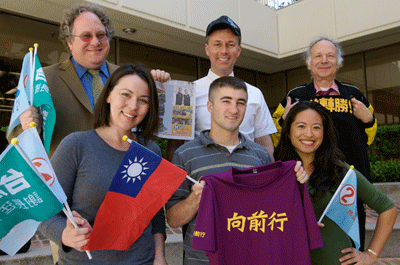Originally published on March 17, 2008 by USC News.
By Suzanne Wu
USC faculty and students will observe the March 22 Taiwanese presidential election and the referendum on whether Taiwan should apply for membership in the United Nations, as part of a trip sponsored by the USC U.S.-China Institute.
“Taiwan is a central issue in the U.S.-China relationship,” said Clayton Dube, associate director of the institute. “We’re only in the second decade of democracy in Taiwan. This election has great implications for the United States and for the United States’ desire for Taiwan and China to maintain a peaceful relationship.”
Dube said that many Americans don’t realize how large Taiwan looms in the minds of Chinese leaders and the Chinese people. The Apple iPhone illustrates the interconnectedness: The iPhone was conceptualized in Cupertino, Calif., engineered in Taiwan and is manufactured in Shenzhen, China, he noted.
More than 10,000 Taiwanese citizens living in California voted in their country’s 2004 election, and Dube said it was difficult to get plane tickets with so many people mobilized and flying back to Taiwan to vote in this year’s election.
Dube will travel with Stanley Rosen, USC professor of political science and East Asian Studies Center director, and Dan Lynch, USC professor of international relations. They will be accompanied by USC students Meg Young, a public diplomacy graduate student who spent a year teaching English in Keelung, Taiwan; Pauline Yang, a piano performance and political science major who has interned for Hillary Clinton’s campaign and with Rep. Rush Holt (D-N.J.) on Capitol Hill; and Damon Ferrara, an international relations and East Asian languages and cultures major who has studied in both Taipei, Taiwan and Nanjing, China.
Each member of the delegation will focus on a particular area related to the election. As part of his research about the messages used to target certain audiences, Rosen plans to collect campaign materials and read five or six newspapers daily to compare coverage. Others on the trip are focusing on the democratization movement, the mechanics and protocols in place to ensure fairness and the mobilization of women and young voters.
They will meet with representatives of the Central Election Commission, which was scrutinized after the close margin in the last presidential election, and other key organizations, including the Taiwan Democracy Foundation and the Mainland Affairs Council.
In addition, the group attended rallies and met with organizers from both political parties as well as scholars, journalists, pollsters and former classmates of current USC students from Taiwan, presenting the opportunity for direct interviews. They also drew on the large USC network in Taiwan, which has one of the most active USC alumni organizations anywhere in the world, according to Grace Shiba, senior director of alumni relations.
“Most Taiwanese elections have been contentious,” said Rosen, who has observed Taiwanese presidential elections since 1991. “This election features two candidates who are much more moderate. The extremes are not there. There have been a number of incidents (including the resignation of Taiwan’s finance minister on March 13), but they have been below the top of the ticket.”
Ma Ying-Jeou of the Kuomingtang Party and former mayor of Taipei was elected with 58 percent of the vote over Frank Hsieh of the Democratic Progressive Party. In a widely carried story by Agence France-Presse, Dube predicted the victory:
“I think that Ma is going to win and that the gap is probably going to be at least 5 percent and as high as 10 percent,” Dube said the day before the election. “Ultimately it turns on fatigue with (outgoing president) Chen Shui-bian and disappointment at job losses and slow economic progress.”
For more on the symposium report, visit http://china.usc.edu




